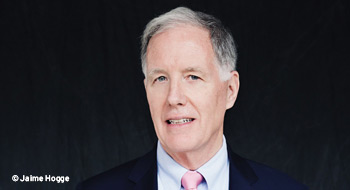

A retiring Leech reflects on lessons learned at Teachers’
Shortly after the Ontario Teachers’ Pension Plan (Teachers’) sold its majority stake in Maple Leaf Sports and Entertainment (MLSE) to Rogers—owner of Benefits Canada—and BCE, Jim Leech’s six-year-old grandson told him he was a “cold-hearted fiduciary.”
As president and CEO of Teachers’, it’s Leech’s job to act in the best interests of 179,000 elementary and secondary school teachers and 124,000 pensioners in the province. The pension plan was prepared to invest more in MLSE by creating a new sports channel for its teams but was persuaded to sell. “Our responsibility is to the teachers of Ontario,” Leech says. “If we can get more today than what we believe it will be worth five years after taking a risk, we take it now.”
The Closer
Leech has had years of experience with making deals—a skill that originally helped him land a job at Teachers’ Private Capital. In 2001, he left the technology sector and was trying to decide what to do next when Claude Lamoureux, then president and CEO, asked him to join Teachers’ as head of its private equity unit.
“Claude convinced me that what he saw in my background—this mergers and acquisitions, operating and businessbuilding experience—would be the ingredients he felt would work in building out the private investing side,” he explains. When Leech took over as president and CEO six years later, Teachers’ assets under management were $104.9 billion. By the end of 2012, they had reached $129.5 billion. “And that includes 2008,” he laughs.
One of the textbook deals was the purchase of a majority stake in Yellow Pages Group (now Yellow Media) with private equity firm KKR & Co. from BCE in 2002. The telecom company was willing to sell and planned to use some of the proceeds from the sale to buy back a stake in Bell Canada. Shortly after the deal was struck, the income trust market became more popular and gave Teachers’ a way to exit the investment with a tidy profit. “I don’t think you can write a private equity story any better,” says Leech.
But the one deal that got away also involved BCE. In the spring of 2007, Teachers’ was BCE’s largest shareholder and was frustrated with the company’s underperformance relative to its peers. An investment group led by the fund won a protracted bidding war to acquire it later that year. But just as the deal was about to close in December 2008, KPMG said BCE wouldn’t meet solvency tests after taking on additional debt for the leveraged buyout, and the group dropped its bid. At first, as the financial crisis worsened, it looked as if Teachers’ had avoided a disaster. However, the company has since performed well under George Cope, the CEO it hand-picked.
Putting Teachers First
Leech recalls a few standout decisions during his time with the fund: revamping Teachers’ executive structure and creating an executive team approach; building a strategic road map to bring all parts of the organization together; bringing in a new compensation system that is competitive with other organizations to attract and retain talent; and expanding and building Teachers’ reputation globally.
Leech says all of these decisions were made in the spirit of looking out for plan members’ best interests. Most people working at Teachers’ have a teacher in their family, he notes, and there’s a good feeling in knowing that they’re helping to give someone a stress-free retirement, financially speaking.
His belief in helping teachers has expanded to include all Canadians, prompting him to co-author The Third Rail: Confronting Our Pension Failures, with the Globe and Mail’s Jacquie McNish. Since joining Teachers’, Leech has gained a real understanding of how critical retirement savings and pensions are—not only for individuals but also for society.
Leech believes that forced saving is the only way for Canadians to put aside enough for retirement. “Our conclusion is that the group that is most at risk right now is the $30,000 to $100,000 wage earner,” he explains. “The easiest way to address that is to expand parts of the CPP.”
New School Rule
Although he’s enjoyed his tenure at Teachers’, the 66-year-old is now looking forward to retirement. He’ll be leaving Teachers’ at the end of 2013. “It’s time for people in this organization to step up and have that opportunity,” he says. “To stick around would stifle that.”
Leech’s retirement plans include taking part in the True Patriot Love Expedition—where business leaders and wounded soldiers will ski about 100 kilometres to the Magnetic North Pole to raise awareness for Canada’s military and their families—in the spring. In addition, starting in July 2014, he will take over as chancellor of Queen’s University.
Leech’s advice for Ron Mock, his successor? He’ll make hundreds of decisions every day, but only a few will become part of his legacy. “And not just his legacy, but what will shape the organization for decades to come,” Leech advises. “Those five or six decisions will impact the organization for a long time. Get those right, and you’re golden.”
Craig Sebastiano is associate editor of BenefitsCanada.com.
Get a PDF of this article.
